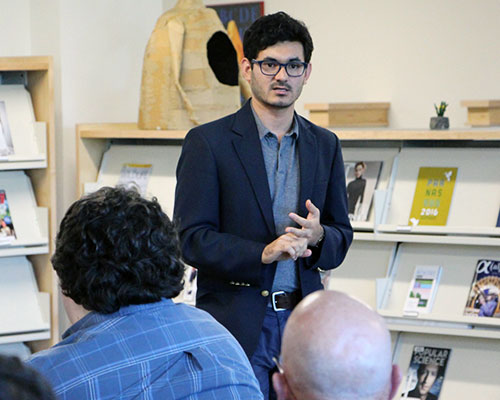One of the primary reasons the girls of Afghanistan are not educated is because there are so few female teachers to teach them.
This is a reality the School for Leadership Afghanistan (SOLA) is working to change, said Mati Amin, chairman of the school’s board of directors, who spoke to Northern Essex Community College faculty, staff and students Wednesday in the Bentley Library on the Haverhill campus.
“Of the 3,800 teachers in one province, just 16 are female and only one has a high school diploma,” he said. He spoke as part of NECC’s “One Geographic Region” Program which explores various issues of the Middle East.
The school brings “quality education to the girls in Afghanistan,” said Amin. Education that is not accessible to them now because there are so few female teachers. Culturally, the families prefer their girls be taught by females. SOLA is working to change that, he said, since quality education has a long-lasting impact. Amin’s fiancée Shabana Basij-Rasikh, is president and co-founder of SOLA, the first and only boarding school for girls in Afghanistan. She founded SOLA while still an undergraduate at Middlebury College. Basij-Rasikh was born and raised in Kabul. She finished high school in the U.S. through the State Department’s Youth Exchange Studies program. While attending Middlebury, she was awarded a Davis Peace Prize—with which she built wells in the outskirts of Kabul.
There are currently 50 girls, ages 11 to 19, who live and learn at the school in Kabul. The intent is to have over 350 girls enrolled within the next five years.
The current curriculum used by most Afghanistan schools, said Amin, is based on memorization with no room for creative thinking, he said. SOLA is developing a curriculum it hopes the Afghanistan National Government will adopt in part or in its entirety.
In addition to receiving an education at the school in Kabul, Amin said, the students are paired with some 80 mentors located throughout the world who meet with the girls via Skype.
“In that sense,” he said, “they get exposure from around the world.”
Their education doesn’t stop there. Today, 50 graduates of SOLA attend college or university in the United States, Great Britain, Jordan and Bangladesh.
The sixth through 12-grade education these girls receive isn’t without danger, Amin said. The school and its administrators deliberately keep a low profile so as not to attract attention from the Taliban. He cited one father who received death threats if he continued to send his daughter to the school.
Funding for the nonprofit school comes from individuals and private institutions primarily in the United States.
During the 2016-2017 academic year, the One Geographic Region program is highlighting the Middle East with speakers, films and other programming. On Friday, Oct. 7, Dr. Bill Heineman, vice president of academic and student affairs, will present “The Middle East: It is not as Complicated as You Think,” from 1:30 to 3 p.m., in the Hartleb Technology Center; on Friday, Nov. 4, Dr. Ligia Domenech will present “Introduction to Islam: Some Basic Concepts” in the Dimitry Building in Lawrence, from 2 to 4 p.m.; and on Friday, Dec. 2, the film, “Wadjda” will be shown at Opportunity Works, from 2 to 4 p.m.

